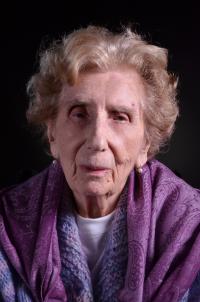The Kinderheim in Auschwitz was a miracle

Stáhnout obrázek
Věra Jílková, née Holznerová, was born on 1 February 1922 in Hronov, to a Czech-oriented Jewish family. Her father did business in textiles, her mother cared for their two daughters and kept the house. After being expelled from the grammar school in Náchod for racial reasons, she completed her secondary school studies at the Jewish grammar school in Brno. In December 1942 she and the whole Holzner family were transported to the ghetto in Terezín. Věra was assigned as a carer in the girls‘ children‘s home, the so-called Heim. In December 1943 the whole family was transported to Auschwitz. The witness continued working with children and adolescents in the children‘s home established in Auschwitz by Fredy Hirsch. In June 1944 she and her younger sister Lydie passed through selection, and in early July they were taken to the Christianstadt labour camp, an affiliate camp of Gross Rosen. When Gross Rosen was evacuated in late February 1945, she and her sister were sent on a death march to Camp Flossenbürg and ended up in Bergen-Belsen in March 1945. There she was liberated in late April 1945. After the war Věra Jílková and her sister returned to Hronov. Both their parents had died during the war. The witness studied at the Faculty of Arts of Charles University in Prague, until 1969 she worked at the Czechoslovak Press Office (ČTK news agency), later she was employed at the Municipal Library in Prague. Even after going into retirement she taught English and worked with young people. Věra Jílková is a widow and she lives in a care home in Prague-Hagibor.
